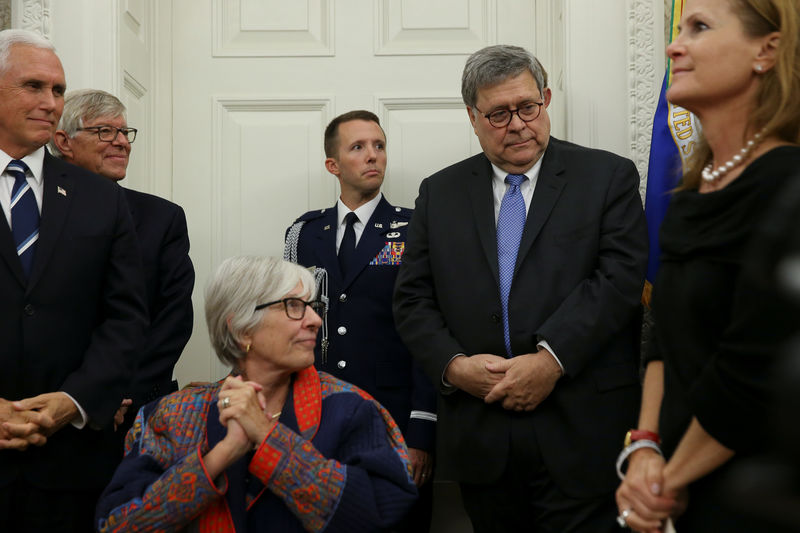By Andy Sullivan, Mark Hosenball and Sarah N. Lynch
WASHINGTON (Reuters) - U.S. Attorney General William Barr has been traveling internationally to help investigate President Donald Trump's complaints that his campaign was improperly targeted by U.S. intelligence and law enforcement agencies during the 2016 presidential election.
Democrats and some former law-enforcement officials say he is using the Justice Department to chase unsubstantiated conspiracy theories that could benefit Trump politically and undermine Special Counsel Robert Mueller's Russia investigation.
Mueller's investigation found that Moscow interfered in the 2016 election to help Trump, and led to criminal convictions of several former campaign aides. But Mueller concluded that he did not have enough evidence to establish a criminal conspiracy with Russia.
Some potential witnesses say they will not cooperate voluntarily with the Barr probe, which was announced after several congressional committees, the Justice Department's internal watchdog and another U.S. prosecutor launched their own reviews.
That could pose problems for John Durham, the prosecutor tapped by Barr to lead the effort.
WHAT IS BEING INVESTIGATED?
Durham is examining whether U.S. intelligence and law-enforcement agencies acted properly when they examined possible ties between the Trump campaign and Russia, which ultimately led to Mueller's investigation.
Trump and some of his political allies say U.S. officials launched the probe to undermine his chances of winning the White House, though they have provided no evidence.
The effort began in July 2016, when the Australian government alerted U.S. officials that a Trump foreign policy adviser, George Papadopoulos, had boasted to an Australian diplomat that the Russian government had material that could be damaging to Trump's opponent, former Secretary of State Hillary Clinton.
Several months later, the FBI secured a court order to monitor Carter Page, a Trump campaign adviser who had traveled to Russia.
Papadopoulos was later prosecuted by Mueller's office and pleaded guilty to lying to the FBI. Page has not been charged.
WHAT IS THE FOCUS OF THE INVESTIGATION?
Barr has reached out to foreign governments for cooperation.
According to a source familiar with the matter, Barr and Durham traveled to Rome in September to meet with Italian intelligence officials about Joseph Mifsud, a Maltese university professor who, according to Mueller's report, had contacts with Russian intelligence officials and told Papadopoulos that Russia had potentially damaging Clinton-related emails.
Papadopoulos has claimed that Mifsud was working for the U.S. Central Intelligence Agency and accused the Italian prime minister at the time, Matteo Renzi, of trying to undermine Trump's 2016 campaign. Renzi said he plans to sue for defamation.
Barr has also reached out to Australia, which has pledged to cooperate. He met with security agencies and government officials in the United Kingdom in July, according to sources familiar with the matter.
People in Ukraine have also been sharing information, according to the Justice Department, but as of two weeks ago, Barr had not spoken with government officials there.
Several former Justice Department officials say Barr's involvement is inappropriate.
A Justice Department spokeswoman declined to comment about the investigation.
Durham's probe seems to be moving at a more deliberate pace in Washington.
While the FBI says it has been cooperating, senior figures involved in the 2016 investigation have not yet heard from Durham's team, according to sources familiar with the matter.
Among them: former FBI general counsel James A. Baker; former CIA Director John Brennan; former Director of National Intelligence James Clapper; former FBI agent Peter Strzok; and David Laufman, a former senior Justice Department official.
"There are no indications that this is an actual investigation," said Shawn Turner, a spokesman for Clapper.
Carter Page, the initial target of the surveillance, also told Reuters he had not heard from Durham's team, but said he had been providing the Justice Department with unsolicited information. Papadopoulos declined to comment.
Other key figures may not be willing to cooperate with the investigation.
Christopher Steele, the former British intelligence officer whose research linking Trump to Russia helped fuel the FBI's initial investigation, does not intend to cooperate with Durham's probe if asked, according to a source familiar with his views.
Current and former officials at the State Department also are unwilling to participate voluntarily, according to a congressional source.
That could create a hurdle for Durham, who according to the New York Times, was not given the authority to subpoena witnesses.
HOW DOES IT DIFFER FROM THE OTHER TWO INVESTIGATIONS?
The Justice Department's internal watchdog, Inspector General Michael Horowitz, has completed a separate, related investigation. His office is going through the process of removing classified information before it releases its findings to the public.
That probe, launched in 2018, focuses on whether the FBI followed proper procedures when it asked the Foreign Intelligence Surveillance Court for permission to monitor Page, the Trump adviser, in 2016.
Separately, former Attorney General Jeff Sessions in 2017 assigned Utah's top federal prosecutor, John Huber, to review a wide range of issues that Republicans had raised, including the FBI's conduct during investigations related to Clinton and Trump.
Huber has ceded some portions of his probe to Durham and is waiting for Horowitz to finish his review.

(This story has been corrected to fix characterization of emails)